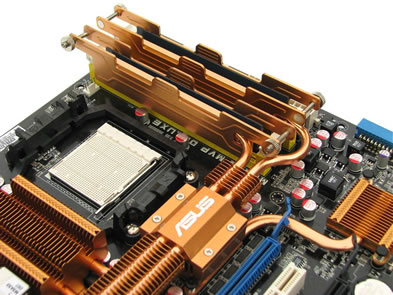After a longer than anticipated delay the new Phenom processors saw the public light last November, but unfortunately for AMD not even then things got back to plan. Put in simple terms, instead of getting a full pack of competitive products, we only got two moderately clocked Phenom processors (9500 and 9600) that are characterized for offering quad-core processing on a budget rather than outpacing competing Intel Core 2s.
As part of the Phenom launch, AMD also unveiled a new platform (used by the ASUS M3A32-MVP we are testing today) built around the AMD 790FX chipset and the semi-new socket AM2+. This new platform still uses DDR2 memory but adds HyperTransport 3.0 support and split power lanes (which benefits power savings). The socket AM2+ is backwards compatible with Athlon X2s and Semprons, so it can serve as a middle platform if you can't upgrade CPU and motherboard all at once.

Now, while this all sounds good, the Phenom still has one major problem that AMD is no doubt working around the clock to correct. A word you probably do not hear very often is "Erratum", though this has been associated with the new Phenom processors quite a bit. Namely there is a hardware bug present in current Phenom processors which can cause problems in instances where software uses nested memory pages. For the short term, AMD has come up with a solution that they call a "TLB patch" that effectively disables the 2MB L3 cache, working as a solution but crippling performance which is not something the Phenom 9500/9600s can afford to forfeit at this stage.
The TLB erratum is said to be fixed in the B3 stepping of all AMD quad-core processors, which includes both Phenom and Barcelona (dual-core) processors, however the new stepping won't become available until next March. Any processors shipped between then and now will still carry the TLB bug, though with the BIOS workaround these machines will not experience a lockup, but will suffer a performance loss. You can begin to figure out how hectic and troublesome these past few months have been for the #2 CPU maker.
The Phenom 9500 began life at $251 while the Phenom 9600 was slightly more expensive at $283, but because of all these problems AMD has reduced the pricing to $199 for the Phenom 9500 and $245 for the Phenom 9600. Furthermore, the AMD Athlon 64 X2 6400+ processor dropped from the $220 price tag set by AMD in November to just $190. What we also now have is a range of new and impressive AM2+ motherboards supporting both AMD Athlon 64 and Phenom processors.
This opens the possibility for a number of upgrade paths. If you are willing to stick with AMD for a while longer, some previous generation AM2 motherboards are compatible with the new Phenoms (check here for yours), or you could also upgrade to a Phenom AM2+ platform today using your current Athlon X2 processor and make the CPU move later on, when the bugs are ironed out, after all the Athlon 64 X2 6400+ is no slouch.
Today we will be taking a look at a new AM2+ motherboard from ASUS that will allow users to do just that. The ASUS M3A32-MVP Deluxe is an impressive looking motherboard with a few unique features we have never seen before.